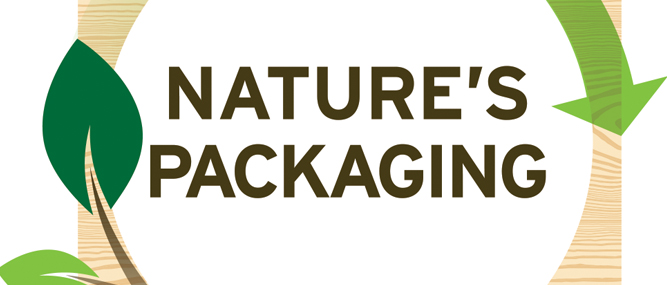The National Wooden Pallet and Container Association (NWPCA), its Canadian counterpart, and the Western Pallet Association (WPA), with help from the Pallet Foundation, is launching an initiative in March to promote the environmental benefits of wood pallets and packaging.
The initiative, dubbed ‘Nature’s Packaging,’ will be in the form of educational materials aimed at pallet users and customers, packaging sourcing departments of Fortune 500 companies, college professors who teach courses related to packaging, and their students.
The educational materials will be published on a website in addition to videos and one-page brochures. These resources will help pallet manufacturers and recyclers market to their customers the positive track record of the wood packaging sector. The website — www.naturespackaging.org — was scheduled to launch March 1. Other elements will be added to the website in the future to keep it fresh and useful.
The purpose of the initiative is to proudly proclaim why wood wins, according to NWPCA president and CEO Brent McClendon.
“We are not attacking other groups or products,” he explained via email, “but celebrating the fantastic sustainability message of wood pallets. Should any group attack wood pallets, Nature’s Packaging will provide documented research, delivering scientific facts on the benefits of wood use in containers and pallets.”
The goal of the initiative is to promote the use of wood pallets and packaging and to educate the target audience about the environmental benefits — that wood as a material is a renewable and sustainable resource, a responsible choice and an economical one.
According to information previously released by the NWPCA, the ‘Nature’s Packaging’ initiative educational materials will emphasize that trees removed from forests to produce lumber and other products are being replenished, and that forests indeed are being renewed and sustained. In addition, the use of wood components for pallets and packaging helps reduce carbon dioxide emissions, which mitigates global warming, and the wood material used in pallets and packaging is recycled.
Lindsey Shean, sales manager and national accounts manager for Valley Pallet, which operates in California and Arizona, served as chairman of the marketing task force. The intent of the initiative is to send a “positive message” about the environmental benefits of using wood, she said in a brief interview.
The initiative will emphasize in part that “wood is a more sustainable alternative than plastic,” she said, but the campaign is not viewed as a public relations battle with the plastic pallet industry. “I don’t think we necessarily want to fight that battle,” said Shean, “go up against plastic. It’s got its applications.”
“That’s really what this whole program is about, that we’re environmentally sustainable. We’re the greatest champions of the sustainability movement.”
“We want to be pro-active,” she added, because there is a great deal of misinformation in the public domain that the forest products industry is not friendly to the environment.
Lindsey said her sales staff has received “a lot more” inquiries and concerns from customers and potential customers in the past 12-18 months, raising questions about whether using wood pallets is bad for the environment. One frequent misconception is that the industry is cutting down so many trees and not managing forests responsibly. “That’s a big one we get all the time.” Another common concern is that scrap pallets end up as solid waste that must be buried in a landfill.
The Valley Pallet sales team counters those objections by explaining that forests are sustainable as well as pointing out how wood packaging is recycled and that wood pallets that are at the end of their life cycle can be further recycled by grinding the wood fiber for use as other products. “It really sparks something in customers,” she said, when they hear about the recycling side of the pallet industry.
The educational materials are being developed by consulting marketing firms. The initiative will cost $180,000 over five years. It is being paid for by contributions from the WPA, the CWPCA, and the Pallet Foundation, with staffing and in-kind support from the NWPCA.
The initiative was announced in August 2015. About 20 volunteers from the three industry associations served on task forces for the initiative to oversee development of the research, marketing information and website.
The Pallet Foundation supports research, education, training, and safety in the wood packaging industry while promoting the industry to end-user markets. It is a charitable foundation, and donations are tax-deductible.
For more information on the foundation or to make a donation, contact the NWPCA at 703/519-6104 or visit www.palletcentral.com.





